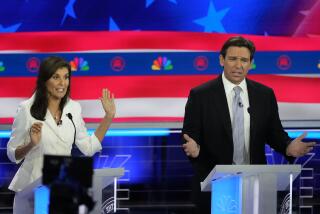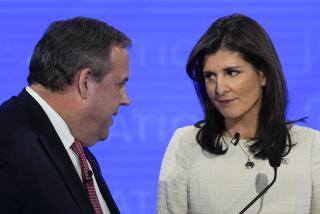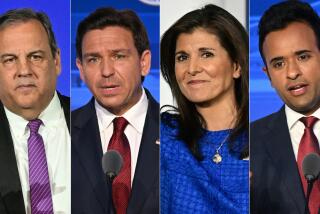After the political conventions, what’s left to debate?
The recently concluded Republican and Democratic conventions accomplished something important, even if they were long on vague goals and short on detailed plans to get there: They sharply defined the differences between President Obama and his Republican rival, former Massachusetts Gov. Mitt Romney. Anyone tuning in for even an hour would come away understanding how the two tickets’ approaches to government clash. For Republicans, federal spending and regulation are a millstone around the neck of the economy; for Democrats, they’re an essential part of the effort to promote growth and an expanding middle class.
So if the choice is so clear, why bother holding four presidential and vice presidential debates next month? Here are a few reasons:
The race is incredibly close. Polls have consistently shown a virtual dead heat between Obama and Romney, with the former’s lead typically within the surveys’ margin of error. Obama is starting to benefit from a post-convention “bounce,” with Gallup reporting Friday a small boost in his lead and his favorability rating. But analysts call it a “bounce” because it’s usually just a temporary lift.
The debates attract a broader audience. In a blog post Thursday, Gallup Editor-in-Chief Frank Newport noted that the GOP convention attracted mainly Republican viewers, and right-leaning Fox News channel had the highest ratings. He predicted that the audience for the Democratic convention would be the mirror image, noting that left-leaning MSNBC was winning the ratings battle this week.
As a result, Newport wrote, “Efforts to use the conventions to change the minds of those who are voting for the opposite party’s candidate present a real challenge, given that a lot of those people simply aren’t watching.... Going along with that, we didn’t see any significant shift in vote intentions following the GOP convention.” In other words, the debates give candidates a better chance than the conventions to preach to the not-yet-converted.
The conventions left some big questions unanswered. The candidates tended to avoid specifics about their legislative plans; for example, Obama promised to create 1 million manufacturing jobs, but he didn’t say how he’d do so. They also avoided the elephant under the Capitol dome: the bitter partisan divide that prevents either side from advancing crucial pieces of its legislative agenda. A good debate moderator will raise those sort of issues, although there’s no guarantee either candidate will give a straight answer.
The debates are a trial run. Knowing where each candidate stands on the issues isn’t necessarily enough for voters. They also want to see how candidates respond to pressure, how well they can articulate and advocate their positions, and how quickly they think on their feet. In a sense, the debates are a proxy for testing how a candidate might respond to the proverbial 3 a.m. phone call, or a high-stakes meeting with a foreign leader.
So, are you planning to tune in when the debates start Oct. 3? Take our proudly unscientific poll, leave a comment or do both!
ALSO:
A patchwork Democratic platform
Elizabeth Warren vs. Mario Cuomo on whom we must help
Follow Jon Healey on Twitter @jcahealey
More to Read
A cure for the common opinion
Get thought-provoking perspectives with our weekly newsletter.
You may occasionally receive promotional content from the Los Angeles Times.







